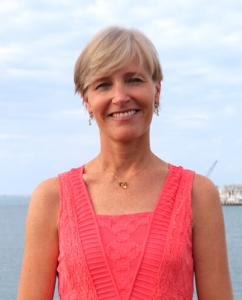Sarah Fangman

Decades of Change in the Florida Reef Tract: An Oral History Project
Florida is home to the only barrier reef in the continental United States. This project uses oral history interviews of coral reef stakeholders in Florida to showcase major changes in the reef tract over the past few decades. The stakeholders interviewed include scientists, fishermen, and SCUBA (Self Contained Underwater Breathing Apparatus) divers.
Sarah Fangman is superintendent of Florida Keys National Marine Sanctuary, overseeing management and operations of a protected area covering 2,900 square nautical miles. She was appointed to the position in July 2017 after serving as superintendent of Gray’s Reef National Marine Sanctuary, Georgia. She has been with the Office of National Marine Sanctuaries since 1998, after serving as a US Presidential Management Fellow with NOAA Fisheries in the Northwest and the Marine Mammal Health and Stranding Response Program in Washington, D.C. As a marine scientist, Fangman was the science coordinator at Channel Islands National Marine Sanctuary in California before becoming program coordinator for the sanctuary system’s Southeast, Gulf of Mexico and Caribbean region. In that capacity, Fangman worked extensively in the Florida Keys conducting more than 400 science dives. Fangman was twice a saturation diver at the Aquarius Reef Base, an underwater research laboratory located off Key Largo. She also served as diver and divemaster on multiple research missions in the Keys aboard the NOAA Ship Nancy Foster. Fangman helped draft the 2011 Florida Keys National Marine Sanctuary Condition Report that prompted the first comprehensive management review since the sanctuary’s designation in 1990.
Scope and Content Note
Sarah Fangman, the Superintendent of Florida Keys National Marine Sanctuary, discusses her role in reef restoration and the challenges faced in the field. She speaks to the issue of shifting baselines, where people don't recognize the declining state of reefs due to lack of awareness. Convincing others of the importance of reef conservation is a struggle, as tourists still visit degraded reefs without realizing their true condition. Sarah emphasizes the urgency of the work she is currently involved in, striving to make a lasting positive impact on the Florida Reef Tract. She urges aspiring marine scientists to act early and not wait, as time may be limited. Sarah hopes her legacy will involve inspiring action and regaining trust. Looking ahead, her focus is on releasing the new Florida Keys National Marine Sanctuary restoration blueprint, securing investments, and implementing on-the-ground restoration efforts. Despite challenges, Sarah remains determined to make a difference and save coral reefs.
Please Note: The oral histories in this collection are protected by copyright and have been created for educational, research and personal use as described by the Fair Use Doctrine in the U.S. Copyright law. Please reach out Voices@noaa.gov to let us know how these interviews are being used in your research, project, exhibit, etc. The Voices staff can help provide other useful resources related to your inquiry.
The NOAA mission is to understand and predict changes in climate, weather, oceans, and coasts, to share that knowledge and information with others, and to conserve and manage coastal and marine ecosystems and resources. The Voices Oral History Archives offers public access to a wide range of accounts, including historical materials that are products of their particular times, and may contain offensive language or negative stereotypes.
Voices Oral History Archives does not verify the accuracy of materials submitted to us. The opinions expressed in the interviews are those of the interviewee only. The interviews here have been made available to the public only after the interviewer has confirmed that they have obtained consent.
